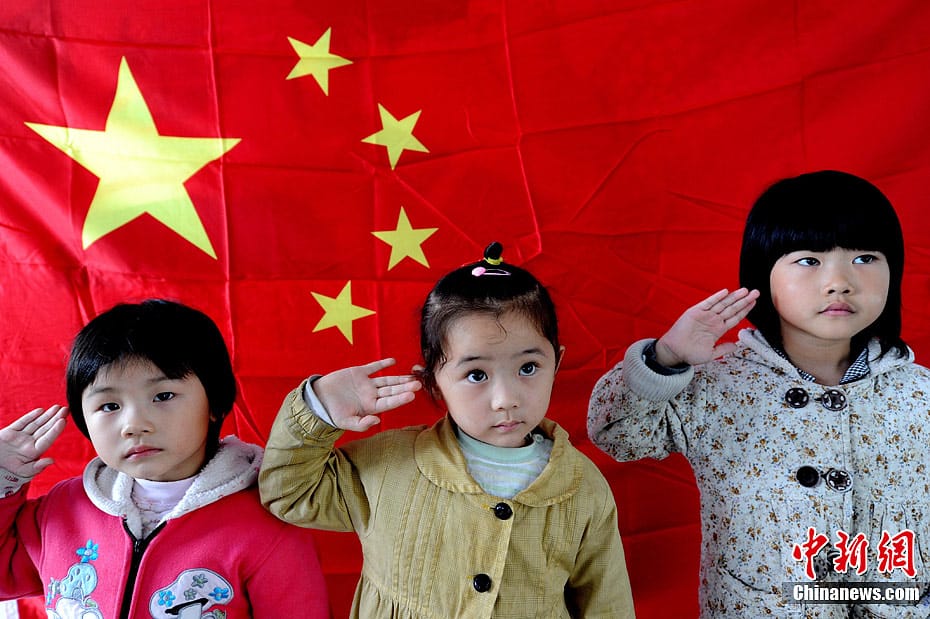Patriotic Education, Party Disciplinary Code
Patriotic Education
爱国主义教育
China's new Patriotic Education Law (爱国主义教育法) came into force on January 1.
It mandates that patriotic education must "uphold the leadership of the Communist Party," follow its ideologies, and cultivate love for the nation, the Party and socialism.
The law outlines nine key areas for patriotic education:
- Ideologies ranging from Marxism-Leninism to Xi Jinping Thought.
- The histories of the Communist Party, the evolution of China, and socialist development.
- The characteristics and achievements of socialism with Chinese characteristics.
- Traditional, revolutionary, and socialist cultures.
- National symbols, such as the flag and anthem.
- Landscapes and cultural heritage.
- The constitution and laws.
- The deeds of heroes and martyrs.
- Other patriotic content.
Expanding beyond governmental boundaries, the law extends the responsibility for patriotic education to entities such as trade unions, women's federations, schools, parents, and others. It notably targets specific groups for focused patriotic education, including religious groups, overseas Chinese, and residents of Hong Kong, Macao, and Taiwan.
The legislation identifies multiple channels for promoting patriotism, such as museums, commemorations, holidays, and media platforms. It also urges internet information service providers to enhance the development and dissemination of patriotic education content.
Furthermore, the law explicitly prohibits actions contrary to patriotic values, encompassing:
(1) Insulting the national flag, national anthem, national emblem, or having other conduct that harms the dignity of the national flag, national anthem, or national emblem;
(2) Distorting, smearing, desecrating, or negating the deeds and spirit of heroes and martyrs;
(3) Advocating, glorifying, or denying wards of aggression, acts of invasion, and massacres;
(4) Occupying, destroying, or defiling patriotic education facilities;
(5) Other conduct prohibited by laws and administrative regulations.
Although the law introduces nothing fundamentally novel, it formalises existing practices, offering them a legal framework.
Aligned with the Party-state's broader strategy, it represents an effort to leverage nationalism for legitimacy and shape China's national identity, two vital goals under Xi Jinping's leadership.
This legislation also underscores the continuous tightening of ideological control and the enforcement of officially sanctioned narratives concerning modern Chinese history.
Globally, intensified efforts by Beijing to instil patriotic values among overseas Chinese may inadvertently raise suspicions about their loyalty to host societies and jeopardise their interests.
National Humiliation
To understand the implications of patriotic education in China, we should reflect on the Patriotic Education Campaign initiated in the 1990s.
The campaign was part of the conservative response to the 1989 Tiananmen Square protests, aimed at restoring the Party's tarnished standing.
The campaign centred on promoting the narrative of "national humiliation." According to this narrative, China was mistreated by foreign powers when it was weak, and now it must become strong to secure its rightful place in the world.
While patriotic education since the 1990s has bolstered the Party's standing, the fixation on pride and victimhood has negatively affected China's global relationships.
Beijing's pursuit of international affirmation to counter its perceived historical humiliations leads to self-defeating behaviours. Attempts to assert power seem threatening, efforts to conceal flaws invite mockery, and the harassment of critics only underscores insecurity.
There is a concurrent national humiliation and superiority narrative in official discourse today. Beijing and many nationalists portray China as the perpetual loser and yet the ultimate victor.
This paradox highlights the complexity of China's self-perception and global position, as well as the political needs of the Party-state.
The message is this: institutionalised patriotic education in the Xi era may have unintended and lasting consequences.

Party Disciplinary Code
党纪律处分条例
The updated version of the Regulations on Disciplinary Actions of the Communist Party of China took effect on January 1, replacing the 2018 edition.
The disciplinary code is a crucial aspect of the framework set by the Communist Party to govern the behaviour of its members, outlining measures for offences like corruption and misconduct.
The new revision doesn't bring structural or fundamental changes to the disciplinary code. Instead, it includes updates such as incorporating the latest political terminology, providing clarifications, and introducing new provisions to address a broader range of behaviours deemed harmful.
Ideology and Principles
Changes in the language regarding ideology and principles in the document reflect the Party's evolving political context and concepts.
A notable addition is an emphasis on maintaining disciplinary strictness over the long term. This aligns with the message from the Third Plenum of the Central Commission for Discipline Inspection, which stressed the ongoing focus of the Party on discipline and anti-corruption efforts.
Another important idea introduced into the document is the concept of "self-revolution," the idea that the Party can constantly reform and cleanse itself.
Recent revelations of corruption in the military-industrial, sports, and financial sectors highlight ongoing issues and cast doubt on the Party's assertion of its intrinsic ability for self-purification.
Summary of Changes to the Disciplinary Code
